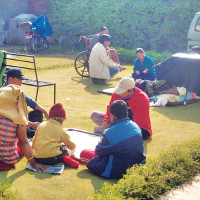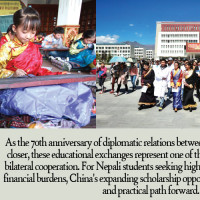- Tuesday, 17 June 2025
Organic Agro-Tourism In Nepal
Dr. Pemba Sherpa (Sangam)
However, there have been difficulties in accurately measuring the actual contribution of the sector to the national coffer, given that a large part of the agriculture sector is informal and is largely subsistence-based.
Contributions
As of the fiscal year (FY) 2018/19, agriculture contributed 27 per cent to the GDP, which has declined from 28.1 per cent in the previous FY 2017/18 (Economic Survey, 2019/20).
The agriculture sector has the second-highest contributions to GDP. The diversification of organic agriculture production, value-addition and technical assistance in sustainable organic agriculture technology is crucial for the sustained growth of the sector because of the growing demand for organic products in the country (Aryal et.al., 2009). Add to this fact, the immense tourism potential of the country also signals the need for the development of integrated approaches for mainstreaming organic agro-tourism promotion policies at national, sub-national and local levels to reap the maximum benefits.
The recent COVID-19 pandemic has immensely affected all development related activities globally. Nepal is no exception to it. The agriculture sector is one of the majorly hit sectors in the context of Nepal because of the lack of proper systemic and regulatory measures at the community levels to safeguard the interests of small-holder farmers.
In this context, structural adjustments to promote organic agriculture combining it with the natural tourism prospects within such remotely located and isolated communities can create an opportunity for sustainable portfolio diversification and increased incomes for such farmers.
This write up sheds light on developing a cyclical model of organic agro-tourism, and how smallholders and commercial farmers can benefit in the long-run. The cyclical model analyses the social, economic, and ecological effects of sustainable organic agro-tourism, which reflect the principles of sustainable development. The model covers nine of 17 goals envisioned by Agenda 2030.
Nepal has undergone a rapid transformation in state structure and governance in the past couple of decades. However, the share of GDP from the agriculture sector has been on a declining trend in the past five years. The reliance of small-time farmers on traditional, primitive technology and lack of effective market networking reflected in high post-harvest loss and low farm prices are among the underlying causes for the decline.
The trend of international migration of youths divergent from the agriculture sector is an example that proves the case. Another pressing issue is the inability to adapt to the effects of climate change such as irregular rainfall patterns, and high plant mortality rates affecting both production scale and productivity (Adhikari et.al., 2020). Finally, the administrative hassles and inadequate capacity for organic certification and intermittent regulatory processes are major impediments to the development of the sector.
The need for organic product specialisation by ensuring certified organic production is particularly important for sustained market reach, finally reaping the highest level of economic and ecological benefits, specifically for the marginalised, women and smallholders in Nepal. These practices also address global concerns of effective climate action targeted toward small-holder farmers and marginalised populations across Nepal through scientific forest management and development of forest-farm based enterprises such as farm stays.
Similarly, an effective regulatory framework along with well-directed policies and programmes is necessary for the reaping of sustainable benefits through organic Agro tourism-related interventions.
Developing countries such as Nepal lack a clear systemic approach towards the implementation of sustainable applications of sustainable tourism practices through organic agriculture at national and sub-national levels.
In addition to this, lack of adequate knowledge among small farmers, local and sub-national governments and line agencies, and discrepancies in financing mechanisms and research and development are the underlying causes impeding the creation of enabling environment for potential benefits from the organic Agro tourism development concept. The national policy regarding organic agro-tourism outreach aims to promote it through the 'Programme Implementation Action Plan 2017'.
This implementation policy highlights policies and programmes, key areas of intervention, and issues and challenges regarding the Agro tourism-related activities in Nepal.
However, it lacks a programme of action for implementing organic agro-tourism applications at local and sub-national levels (Agriculture Development Directorate, 2017).
Strategies
According to the approach paper drafted by the Ministry of Land Management, Agriculture and Cooperatives, as highlighted in the 14th Plan, niche organic agriculture products are placed as one of the priority sectors. However, reliance on traditional subsistence farming methods, overuse of chemical fertilisers and pesticides, and discrepancies in local-level programming are the major impediments to achieving targeted growth in the sector.
Some of the few strategies that need to be adopted for the sustainable development of the organic agro tourism in Nepal are (but are not limited to): Conducting market-oriented research on the understanding and level of awareness of smallholder farmers and local/electoral governments towards organic agro-tourism applications and creating an inventory of existing practices of organic agro tourism-related programmes and their implementation in the sub-national and local context.
Other key strategies are - developing strategies to address financial, technical and policy constraints for organic agro tourism applications, identifying and piloting key areas of intervention, developing a scientific and policy research forum to advocate organic agro-tourism activities, making farmers capable of using sustainable technologies and creating knowledge sharing platform/s and branding parameters by collaborating between private sectors. academic institutions, local/electoral governments, and other line agencies.
The organic agro-tourism industry has brought itself into the limelight as the future for sustainable Nepalese tourism. Nepal is one of the most beautiful countries because of its incredible scenic places, diverse and unique traditional cultures, and heritages.
The unique geographical positioning within the lap of the Himalayas and diverse altitudinal variations has made Nepal the biggest natural museum in the world. Similarly, Nepal has a potential for producing varieties of organic agricultural produce and livestock due to its geographically diversified structure, suitable climate, and availability of other organic inputs such as water and soil.
In a nutshell, the sustainable development of organic agro-tourism has become a key step toward realising the economic and ecological revival of agrarian Nepali society.
Given the focused intent and vigour for developing specialised organic agro-tourism-related products at community and local levels, and given the establishment of institutional mechanisms for technology and knowledge-sharing platforms, the overarching objective of economic empowerment through organic agro-tourism and agricultural modernisation is achievable. Both organic agro-tourism and agrarian moderanisation are crucial components for sustained economic growth in the nation.
(The author is an organic agro-tourism development concept developer)

















